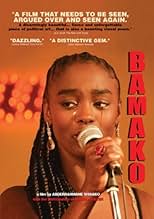Füge eine Handlung in deiner Sprache hinzuBamako. Melé is a bar singer, her husband Chaka is out of work and the couple is on the verge of breaking up... In the courtyard of the house they share with other families, a trial court ha... Alles lesenBamako. Melé is a bar singer, her husband Chaka is out of work and the couple is on the verge of breaking up... In the courtyard of the house they share with other families, a trial court has been set up. African civil society spokesmen have taken proceedings against the World Ba... Alles lesenBamako. Melé is a bar singer, her husband Chaka is out of work and the couple is on the verge of breaking up... In the courtyard of the house they share with other families, a trial court has been set up. African civil society spokesmen have taken proceedings against the World Bank and the IMF whom they blame for Africa's woes... Amidst the pleas and the testimonies, ... Alles lesen
- Auszeichnungen
- 4 Gewinne & 2 Nominierungen insgesamt
- Saramba
- (as Hélène Diarra)
- Avocat de la défense
- (as Mamadou Konaté)
- Le procureur
- (as Magma Gabriel Konaté)
- Cow-boy
- (as Dramane Sissako)
Handlung
WUSSTEST DU SCHON:
- PatzerDuring the inset "Death in Timbuktu" "western," just before the first gunshot, a car can be seen moving between two buildings in the background. This, however, could be interpreted as intentional by the director, who was parodying non-Western interpretations of a "western" (other countries who partake in a love of westerns are Thailand and Cambodia). The child in this scene is also wearing a Nike shirt. The effect is to present the sort of low-budget, pulp film one might see in a television broadcast in Mali, while supplying a metaphor to the actual movie's plot.
- Zitate
Avocat partie civile: We cannot throw Paul Wolfowitz into the Niger. The caimans wouldn't want him.
There is a whole panoply of characters a beautiful queen bee (an example of the grace and poise of African women), Melé (Aissa Maiga) and her husband Chaka (Tiecoura Traore). Melé's a popular singer whose marriage is disintegrating and two of her spirited songs are integrated into the film. People watch TV, and the director ironically injects into his film a "western" set in Timbukto, in which incongruous white men as well as Palestinian director Elia Suleiman and Bamako's producer Danny Glover shoot each other. The effect is grotesque, but that's the point: why should Africans be watching TV westerns? Elsewhere on the earthy "set" of the film there's a young man, also beautiful, who lies dying inside a nearby building with no medical care. There are many children, some playing about, some being breast-fed. A couple marry, and the festivities interrupt the trial. There's a flinty gatekeeper who decides who can come in and who can't. There's a traditional griot who's one of the "witnesses" and who ends the proceedings with a hypnotic chant (not translated, but strangely stirring and stunning). There's another "witness" a former schoolteacher so hopelessly demoralized he refuses to utter a word; a sound recordist; a video photographer who says he prefers to take pictures of the dead because they're more real; and many authentic-looking extras, including a variety of dried-up tough young-old (or ageless) stick-men, all of them coming and going.
You get a vivid sense from all this, which is rhythmically inter-cut with the trial itself, of the harmonious seeming chaos of African village life; the color, the beauty and dignity of the people. You get above all a sense that life goes on. There are two white men on the "stage" of the trial, one an advocate for the international organizations (Roland Rappoport) and the other (William Bourdon) eloquently speaking for the African people and for socialism who concludes that the first world should be sentenced "to community service" "forever." Eloquent though he is, a Malian woman lawyer who speaks after him (Aissata Tall Sall) is more touching.
Like An Inconvenient Truth, Bamako's trial presents facts and arguments of enormous present day importance this time surrounding not global warming and the disintegration of the earth's eco-system, but another set of the planet's major problems: the social imbalances, the domination of the many by the few; poverty and disease, "terrorism" used to excuse world domination, the richest nations' doing harm while seeming to do good; the ravages of globalization, the privatization of natural resources down to land and water, perhaps ultimately to air; the national debts of poor nations collected by the economic organizations of the rich ones, and thereby preventing the poor ones from gaining any ground against the ravages of poverty and underdevelopment. .
This is powerful stuff. Sisako is, in theory, presenting both sides of the story, though it is obviously which side he is on and which side is in the majority on screen. This is polemic. The international organizations obviously aren't overtly setting out to destroy Africa are they? It is preaching; but it is done in a rich and colorful and dramatically moving way. The film picked up a US distributor during the New York Film Festival. It's not clear whether the way the print was presented was accurate. This seemed to be a projection of a digital copy that lost the surface beauty of the original. The colors of Jacques Besse's photography were beautiful, but dimmed. In French and Bambara (the Malian language).
- Chris Knipp
- 26. Sept. 2006
- Permalink
Top-Auswahl
- How long is Bamako (The Court)?Powered by Alexa
Details
Box Office
- Budget
- 2.000.000 € (geschätzt)
- Bruttoertrag in den USA und Kanada
- 112.351 $
- Eröffnungswochenende in den USA und in Kanada
- 10.183 $
- 18. Feb. 2007
- Weltweiter Bruttoertrag
- 1.059.232 $
- Laufzeit1 Stunde 55 Minuten
- Farbe
- Sound-Mix
- Seitenverhältnis
- 1.85 : 1
Zu dieser Seite beitragen











